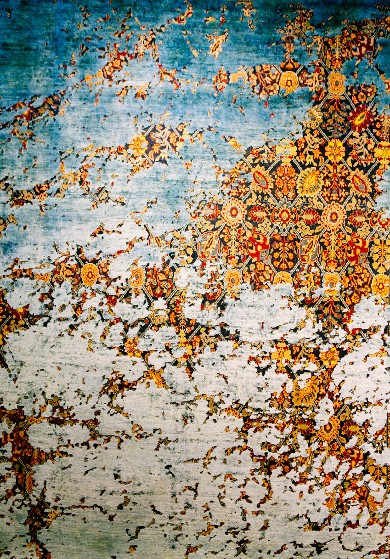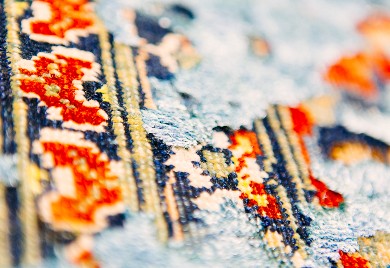The Ahmadi brothers, from left: Zubair, Zabi, Assad and Murtaza at the Amadi Carpets booth at the New York International Carpets Show, where the Tuareg collection premiered.
The Tuareg rugs are woven by women trained in Amadi's own workshops in Afghanistan, set up with the intention of providing hope and change for those less fortunate than the Ahmadi brothers, who sit at the helm of the successful West Hollywood-based rug company.
Featured at the Amadi Carpets exhibit at NYICS is a Tuareg collection design hand-crafted by women at the company's facility in Afghanistan.
Refugees who fled on foot from the Soviet War in Afghanistan, brothers Assad, Zabi, Zubair, and Murtaza Ahmadi set up their first weaving center in Kabul in 2003, employing 20 local women. "We converted our father's vacant home, and in honor of him after his passing, opened up this facility specifically for women," explained Murtaza Ahmadi, who is also president and owner of the New York International Carpet Show (NYICS) since early 2015.
"We are taking on not just skilled, but unskilled workers as well. Whatever products we sell out of the center, we invest back into the program. At the moment we have 120 or so women, with girls as young as 18, and women as old as 72," continued Ahmadi.
A geometric tribal motif in contemporary colors from the Tuareg collection by Amadi Carpets.
At the Amadi weaving center women are taught weaving skills, but also attend educational classes to improve literacy, which is extremely beneficial in a country where 85 percent of women have no formal education. "You help empower one woman and you have empowered a whole family. You empower more than one woman and you have empowered a whole community," added Zubair Ahmadi.
He noted that he and his brothers personally approached the families of the women who are now employed to ask them to allow their mothers, daughters and wives to work. They offered to provide safe bus transportation from the Kabul area to and from the weaving center, as an additional incentive.
Zubair Ahmadi of Amadi Carpets sees a positive effect in the communities of women who have been trained at the company's weaving center in Afghanistan.
"Once they are beyond this place, they will have a skill and be able to fend for themselves. I think that in most societies, especially in Afghanistan, the woman's role is extremely important, and if we can support them, then we will have a long-term effect in a positive way," Murtaza told RugNews.com.
WestEdge Design Fair Intros
At the recent WestEdge Design Fair, Murtaza Ahmadi points to an Ikat collection rug woven by women at the Amadi Carpets weaving center in Afghanistan.
Along with the Tuareg collection's tribal designs and organic colorations, which had previously debuted at NYICS in September 2016, Amadi's exhibit at the 2016 WestEdge Design Fair featured a series of new looks from its Ikat collection, also woven by Afghan women at the company's weaving facility.
A colorful and intricate Ikat collection rug by Afghan women trained to weave carpets for Amadi.
Amadi also brought to the Santa Monica show its Vintage Yarn collection and a group of new custom-order felt designs in crisp graphics that can be used for covering ottomans.
On display at WestEdge, a graphic Felt collection rug is shown as a covering for an ottoman.
Over the course of nearly 20 years in the industry, Amadi Carpets has focused on the art behind its rug designs. As collectors themselves, the Ahmadi family is inspired by antique patterns and motifs. Their design inspiration is not limited to just antique carpets, but is also derived from textiles, embroideries, and even antique headdresses.
Amadi Carpets brought both new rugs and antique textiles to display at its WestEdge Design Fair booth.
Art for the Floor
"What's different about us is that we don't just replicate patterns. We take an element of a pattern and make it our own. With the lines that we carry and the works that we carry, we don't play it safe.
"We are not afraid of color. We are not afraid of patterns and designs. But it has to make sense; it cannot be just for the sake of doing something different," Murtaza Ahmadi explains.
Vibrant colors make the Amadi Carpets' Vintage Yarn collection a standout.
"When you are developing and making a piece, I think it has to move you. I believe that what we do is art for the floor. I mean, you don't have to like it; it may not be your aesthetic. But it does give you a reaction. And with a great piece, whether a negative reaction or a positive reaction, you should feel something," he said.
Ahmadi explained that although their work and investment in their facility in Afghanistan sets Amadi Carpets apart from other companies, it is their well thought-out patterns and the high level of execution that keep them relevant within the industry.
"That's what we are very proud of: the design and the color sense, and the harmony of the two together. We are socially responsible at the core, and we would have this facility whether people know about it or they don't. It is not a marketing tool for us; we want this to be a success."
 Amadi Carpets creates a unique fashion look by removing part of a design with distressing. The detail below shows depth of texture.
Amadi Carpets creates a unique fashion look by removing part of a design with distressing. The detail below shows depth of texture.
